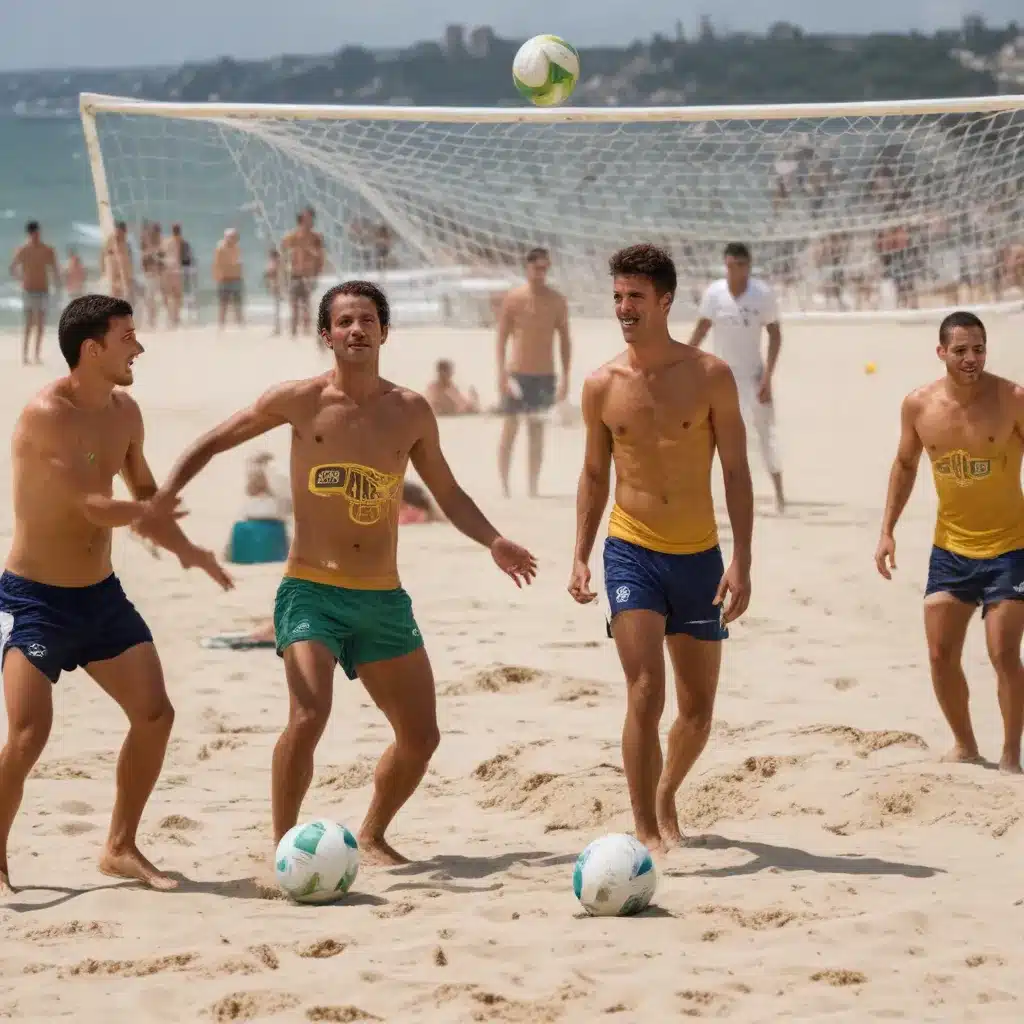
The Brazilian Football Landscape
Brazil’s football legacy is unparalleled, with a rich tapestry of national team triumphs, legendary club dynasties, and a unique brand of silky, improvised play that has captivated the world. From the iconic yellow-and-green shirts of the Seleção to the fervent, drum-beating passion of the Brasileirão’s fanatical supporters, the country’s love affair with the beautiful game is deeply ingrained in its cultural identity.
Beyond the hallowed grounds of the stadiums, however, lies another realm of Brazilian football that has steadily carved out its own space on the global stage – the sun-drenched, sand-covered beaches that have become the breeding ground for a thrilling, acrobatic variant of the sport: beach soccer.
The Rise of Beach Soccer in Brazil
While football’s traditional indoor incarnation has long dominated the national psyche, beach soccer’s popularity has steadily grown, driven by Brazil’s idyllic coastal geography, a rich culture of beach-based leisure, and a seemingly endless pool of supremely talented athletes.
The origins of organized beach soccer in Brazil can be traced back to the 1990s, when the first official tournaments began to emerge, showcasing the skills of players who had honed their craft in the informal pickup games that had long been a fixture of the country’s beachfront communities. As the sport’s profile began to rise, a new generation of stars soon captured the public’s imagination, with players like Benjani, Jorginho, and Romario mesmerizing audiences with their gravity-defying tricks and clinical finishing.
Pioneering Coaches and Tactical Evolution
Integral to beach soccer’s ascent has been the work of innovative coaches who have refined the sport’s unique tactical approaches, blending the flair and individual brilliance of traditional Brazilian football with the specialized demands of the beach game.
One such pioneer is Alessandro Rosa Vieira, better known as “Bebeto de Freitas”, who helped establish the Brazilian national beach soccer team as a dominant force on the global stage. Bebeto’s coaching philosophy emphasized the importance of technical mastery, quick decision-making, and a seamless integration of defensive and offensive responsibilities – traits that have become hallmarks of Brazil’s beach soccer identity.
Under Bebeto’s guidance, the Seleção de Areia (Beach Seleção) became synonymous with a high-tempo, possession-based style that prioritized creative expression and clinical finishing. This approach has been further refined and built upon by subsequent generations of beach soccer tacticians, who have continued to push the boundaries of what is possible on the sand.
Nurturing Grassroots Talent
Brazil’s success in beach soccer has also been underpinned by a robust system of talent identification and development, with the country’s coastal communities serving as a rich breeding ground for the next generation of stars.
Local tournaments and youth academies have played a crucial role in unearthing and honing the skills of promising young players, many of whom have gone on to represent Brazil at the highest levels of the sport. This grassroots approach has ensured a steady flow of technically gifted, athletically gifted individuals into the national team setup, helping to sustain the country’s dominance on the beach soccer stage.
Adapting to the Changing Tides
As beach soccer has continued to evolve, both in Brazil and globally, the sport has faced a number of challenges that have required adaptability and innovation from its key stakeholders. One of the most pressing issues has been the need to establish a coherent, well-structured domestic league that can provide a stable platform for the growth of the sport.
In recent years, the Brazilian Beach Soccer League (BBSL) has emerged as a crucial driver of the sport’s development, offering professional players a competitive and high-profile stage to showcase their talents. The league has also played a vital role in strengthening the connection between beach soccer and its traditional indoor counterpart, with many top Brasileirão clubs now fielding their own beach soccer teams.
This integration with the broader football ecosystem has been essential in raising the profile and legitimacy of beach soccer within Brazil, helping to attract greater investment, media coverage, and fan engagement. Moreover, the cross-pollination of ideas and training methodologies between the indoor and outdoor variants of the sport has led to a rich tactical dialogue, with beach soccer’s emphasis on individual skill and improvisation increasingly influencing the strategic approaches of traditional football.
The Future of Beach Soccer in Brazil
As Brazil continues to navigate the changing tides of beach soccer’s evolution, the sport’s long-term success will depend on its ability to maintain its distinct identity while seamlessly integrating with the broader football landscape. This will require ongoing investment in grassroots development, the creation of sustainable professional pathways, and a concerted effort to engage with the next generation of beach soccer enthusiasts.
One key area of focus will be the continued refinement of coaching methodologies, as the country’s beach soccer tacticians work to balance the traditional flair and creativity of the Brazilian game with the increasingly sophisticated tactical demands of the modern era. By striking this delicate balance, Brazil can ensure that its beach soccer teams remain at the forefront of global innovation, captivating audiences with their unique blend of skill, athleticism, and infectious passion.
Ultimately, the future of beach soccer in Brazil lies in its ability to adapt and evolve, while remaining true to the essence of the country’s football heritage. As the sport continues to make waves on the international stage, the Brazilian beach soccer story will undoubtedly serve as an inspiration to aspiring players and fans around the world, cementing the country’s status as a true global powerhouse of the beautiful game.

